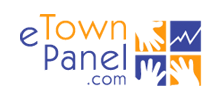FAQs by Cities & Towns
Q: How do cities and towns benefit?
Participating cities and towns will enjoy the following benefits:
-
Online access to citizen satisfaction
ratings for your city or town, updated quarterly and benchmarked
against national norms. Link to your results at eTownPanel.com/YourCity.htm
-
Low-cost access to local panelists
when you need to do your own custom surveys on important local
issues. Survey your local citizens for a fraction of the
cost of traditional mail or telephone surveys.
-
Find out what people in your community
think about important local issues. Build trust and confidence among
citizens by giving them the chance to make their voices heard.
Q: How can a city or town participate
in eTownPanel?
Your city or town can participate by building a local panel in your
area of at least 300 citizens. We can provide web and email tools that
nonprofit groups or government agencies can use to build their local
panel. We can also help you do a direct mail postcard campaign to your
local citizens at a reasonable cost. Just email us at [email protected]
to find out more. Upon achievement of the minimum panel
size, the city or town will be added to the eTownPanel website.
Q: What does it cost a city or town
to be included in eTownPanel?
Basic participation in eTownPanel is free for any city, town, or
county in the United States. Basic participation includes our standard
Quarterly Questionnaire and summary, online results. To do a custom
survey using either national or local panelists, or to obtain more
specialized data analysis, contact eTownPanel at [email protected]
for a cost estimate.
Q: How would a city or town mail out
postcards -- and how much do they cost?
Postcards can help your city or town build its local panel -- and
they reach a more representative cross-section of the community than
web-based or email methods of outreach. We have attractive and
effective eTownPanel postcard designs ready to go, and we can send
them to a random sample of online households in your geographic area
at a reasonable cost. Please
contact us at [email protected]
for more information.
Q: How can a city or town use
eTownPanel to do a custom survey?
Any nonprofit group or government agency from a participating city
or town can do their own, custom survey using eTownPanel. We require a
brief written proposal describing the sponsor and the purpose of the
research along with a draft questionnaire. Questionnaires must be
composed of primarily close-ended questions and limited to no more
than 30 questions or 15 minutes in length. eTownPanel
will set up the web-based questionnaire, invite
panelists by email, collect the data online, and
provide you with a final dataset and
documentation. (Because the identities of
individual respondents must remain confidential,
the datasets do not contain any email addresses or
other personal identifiers.) Please
contact us at [email protected]
for a cost estimate.
Q: What topics are appropriate for a
custom survey?
Custom surveys must be sponsored by a nonprofit group, academic
institution, or government organization and must relate to the general
topic domain of eTownPanel -- government performance and community
quality of life. This topic domain is broad and includes: the
environment, public safety, transportation, recreation, education,
issue awareness, taxation, public works, culture and the arts, and
other important community issues. For some
examples of prior studies, see our
Special Reports. However, eTownPanel cannot be used
for political polls, market research, or surveys about sensitive or
potentially offensive topics. eTownPanel reserves the right to judge
which questionnaires or individual questions are appropriate for an
eTownPanel survey.
Q: Can eTownPanel be used to do a
statewide or nationwide survey?
Yes -- provided the sponsor of the survey is a nonprofit,
nonpartisan organization and the topic of the survey is an appropriate
one for eTownPanel.
Q: Are eTownPanel surveys
"scientific"?
eTownPanel surveys are based on a sample of volunteer panelists
from a localities across the US and not a random sample. Strictly speaking,
therefore, the results are not statistically projectable to the larger
population. In presenting results, we compare the
characteristics of the panel to the general population. We also
weight the results so that they better reflect the general population.
|
